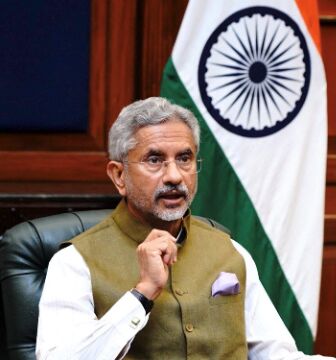Renewed focus
Jaishankar’s strategically significant Nairobi visit emphasised consolidating economic collaboration with African nations during and after the pandemic

The pace of engagement of New Delhi with Africa picked up considerably in the recent past. For over a decade, India has been preparing to step up this interaction and build upon its age-old ties with countries on the continent.
An affirmation of India's continued focus in the region came recently through External Affairs Minister S Jaishankar's Nairobi visit last week. Significantly, it was the first in-person visit by the minister to Africa as India and the world embark on a cautious approach amid the pandemic.
At present, India and Kenya are serving as non-permanent members on the UN Security Council and in the Commonwealth. The two countries reaffirmed their commitment to a rules-based multilateral system and shared a common vision on the importance of the world bodies in addressing existing global challenges.
Among the most important components of the June 12-14 visit by the minister was the third session of the Joint Commission, which last met in 2019. That the meeting was held in the backdrop of a world ravaged by the pandemic, both India and Kenya emphasised the need for joint efforts to combat the virus and work towards consolidating economic collaboration during the pandemic and in the post-pandemic phase.
There was a convergence of views that most countries in the world, including African nations, would need equitable and affordable access to vaccines. On its part, India played a significant role in reaching out to needy nations by supplying medical equipment, medicines and personnel protection gears. In addition, New Delhi extended help through vaccines earlier this year.
Under the Vaccine Maitri outreach, several countries in Africa received some 25 million doses of AstraZeneca. Part of this consignment was under the WHO-mandated COVAX and commercial supplies. Now, India has halted the supply of the vaccines as it began a rigorous inoculation drive domestically after the country was hit by the ravaging second wave.
During his interaction with representatives of the Indian community, members did raise the issue of vaccine supply. Kenya has some 80,000 overseas Indians including some 20,000 Indians whose concern on the issue is understandable.
While explaining the situation, Jaishankar clarified things will be different in the coming months as there will be more vaccines due to increased production. India would revisit the issue but, for the present, considering the magnitude of the second wave, its focus remains on vaccinating people at home.
Besides the immediate task in dealing with the pandemic, India reiterated that its approach to Africa is guided by the 10 principles outlined by Prime Minister Narendra Modi in July 2018. As for Kenya, India plans to build upon the bilateral ties aligning with Nairobi's Big Four Agenda – manufacturing, affordable housing, universal health and food security.
India enjoys a unique relationship with Kenya and members of the African Union, in which Kenya plays an important role. The development comes at a time when major powers like the United States and China are competing in the region as the continent marches towards development.
It is this landscape that made India launch a major initiative through the India-Africa Forum and, since 2008, three summit meetings were held with the last at New Delhi in 2015 witnessing record participation. The scheduled fourth edition, delayed due to the pandemic last year, is expected to be rolled out later this year. Over the last five years, India has opened more missions in Africa, and extended lines of credit with some 37 projects underway in various countries.
One major advantage that New Delhi enjoys is the people's goodwill. India is the second-largest investor in Kenya. Over 60 Indian companies have invested in manufacturing, real estate, pharmaceuticals, telecom, banking, IT and IT-enabled services and agro-based industry. Kenya is keen on attracting further investments in automobile, affordable housing, pharmaceuticals and agro-processing.
In strategic terms, India and Kenya are connected by the sea. Both countries have stakes in greater security and safety in the Indian Ocean Region. Now that the world is increasingly focused on Indo-Pacific Region and, for India, it extends to the shores of Africa, Kenya remains a key country.
There was a convergence between India and Kenya as the statement from the Joint Commission underlines and that is imperative to increase sharing of capabilities and awareness of the Indian Ocean Region. Both countries took note that terrorism, in all its forms and manifestations, is a common threat to humanity, and agreed to explore institutional cooperation in tackling this scourge.
The strategic location of Kenya, whose shores are lapped by the sea, is now under the spotlight as a part of the Indo-Pacific. Its importance cannot be overstressed. In this context, both sides discussed the security situations in the region and the Horn of Africa and expressed concerns at the growing radicalisation and violent extremism in parts of Africa and Asia.
Views expressed are personal



